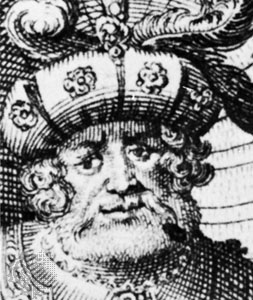Henry X, Duke of Bavaria facts for kids
Quick facts for kids
Henry X the Proud
|
|
|---|---|
| Duke of Bavaria | |
 |
|
| Born | c. 1108 |
| Died | 20 October 1139 Quedlinburg |
| Buried | Imperial Cathedral of Königslutter |
| Noble family | House of Welf |
| Spouse(s) | Gertrude of Süpplingenburg |
| Issue | Henry III / XII the Lion |
| Father | Henry IX, Duke of Bavaria |
| Mother | Wulfhilde of Saxony |
Henry the Proud (German: Heinrich der Stolze) was an important duke from the House of Welf. He lived from around 1108 to October 20, 1139. Henry was the Duke of Bavaria from 1126 to 1138. He also became the Duke of Saxony and the Margrave of Tuscany from 1137 until his death. In 1138, he wanted to become the King of Germany, but he lost to Conrad of Hohenstaufen.
Contents
His Family and Early Life
Henry was the second son of Duke Henry IX of Bavaria and Wulfhilde of Saxony. His mother, Wulfhilde, was the daughter of Duke Magnus of Saxony. This meant Henry was not only part of the Welf family, but he also had strong ties to the important Saxon family called the Billungs.
In 1123, Henry became an adult. In 1126, his father decided to retire to a monastery and died soon after. Henry's older brother, Conrad, joined a religious order. Because of this, Henry became the Duke of Bavaria. He shared the family's lands in Saxony, Bavaria, and Swabia with his younger brother, Welf VI.
Marriage and Power
In 1127, Henry married Gertrude. She was the only child of King Lothair III of Germany. Henry's father had been promised this marriage. It was a reward for supporting Lothair in the royal election of 1125. This was against the Hohenstaufen family.
Gertrude was very rich. She inherited lands from three important Saxon families: the Supplinburg, the Brunonids, and the counts of Northeim. This marriage greatly increased the power of the Welf family. They had been dukes of Bavaria since 1070. Now, their influence spread to northern Germany. Henry and Gertrude had one son, Henry the Lion.
A Powerful Duke
Henry was a very loyal supporter of his father-in-law, King Lothair. They fought against the Hohenstaufen brothers, Duke Frederick II of Swabia and Conrad. Frederick was actually Henry's brother-in-law, as he was married to Henry's sister Judith. Conrad was trying to become king against Lothair.
While fighting the Hohenstaufens, Henry also had to deal with a rebellion in Bavaria. Count Frederick of Bogen led this uprising. Both Henry and Count Frederick tried to put their own chosen person in charge of the church in Regensburg. After a destructive war, Count Frederick gave up in 1133. Two years later, the Hohenstaufen brothers made peace with Emperor Lothair.
Becoming Even More Important
In 1136, Henry went with his father-in-law, King Lothair, to Italy. Henry led a part of the army into southern Italy, into the Kingdom of Sicily. They marched all the way to Bari, causing damage along the way. Henry showed great skill as a military leader during this trip.
Because of his success, Henry was given more important roles. He became the Margrave of Tuscany. He also became Lothair's chosen successor for the Duchy of Saxony. The Pope also gave him private lands that belonged to the late Margravine Matilda of Tuscany.
Trying to Become King
When Emperor Lothair died in December 1137, Henry was very rich and powerful. This made him a strong candidate to become the next King of Germany. A writer from that time, Otto of Freising, said that Henry boasted about his lands. He claimed they stretched "from sea to sea, from Denmark to Sicily."
However, the very qualities that earned him the nickname "the Proud" also made the other German princes jealous. This jealousy stopped him from being chosen as king. The new king, Conrad III, demanded that Henry return the royal symbols he had received from Lothair. Henry, in turn, asked to be officially given the Duchy of Saxony.
But Conrad was afraid of Henry's power. He refused Henry's request. Conrad said it was against the law for one person to control two large duchies. Attempts to find a solution failed. In July 1138, Henry refused to promise his loyalty to Conrad. Because of this, he was declared an outlaw and lost both his duchies.
Bavaria was given to Leopold IV of Austria, who was King Conrad's half-brother. Saxony, which Henry had tried to keep but was never officially given, went to Albert the Bear. Albert was the son of Eilika of Saxony, a younger daughter of the last Billung duke.
Death and What Happened Next
In 1139, Henry successfully drove his enemies out of Saxony. He was getting ready to attack Bavaria when he suddenly died in Quedlinburg. Henry is buried in the Imperial Cathedral of Königslutter. He is buried next to his father-in-law, Emperor Lothair, and his mother-in-law, Richenza of Northeim.
After Henry's death, his son Henry the Lion was still a child. Later, Henry the Lion would receive Saxony. Bavaria was given to Henry II, Duke of Austria.
A writer known as Conrad the Priest likely wrote the German version of "The Song of Roland" (called the Rolandslied) while working for Henry. Queen Gertrude had asked for it.

